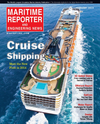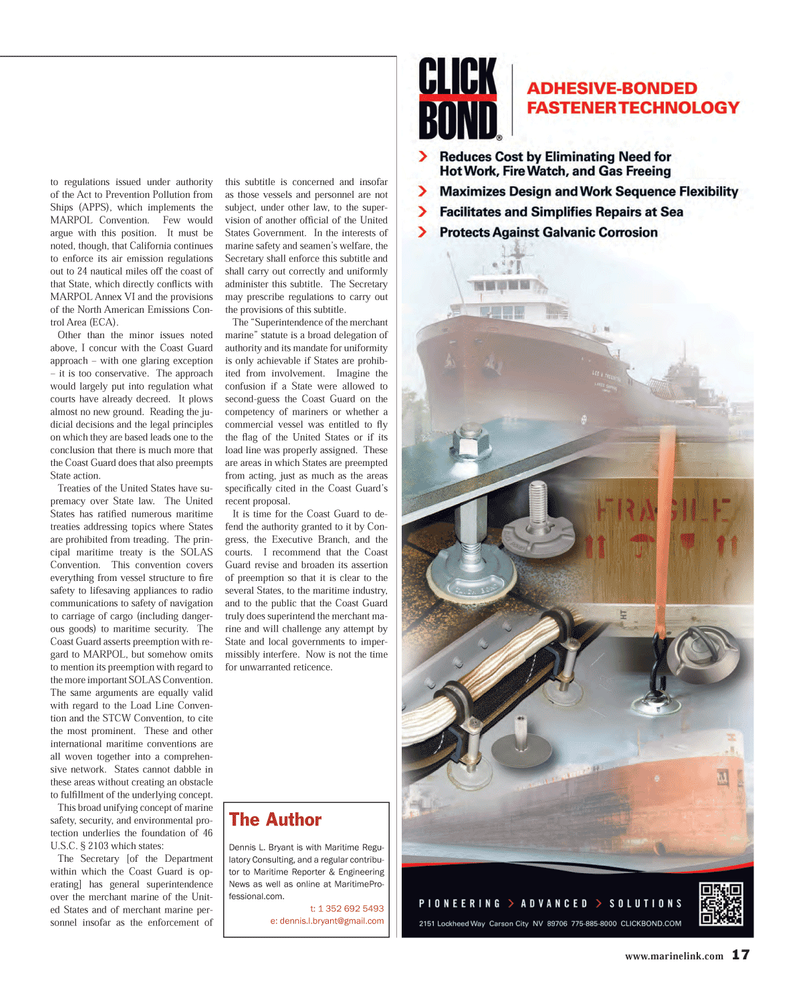
Page 17: of Maritime Reporter Magazine (February 2014)
Cruise Shipping Edition
Read this page in Pdf, Flash or Html5 edition of February 2014 Maritime Reporter Magazine
www.marinelink.com 17 to regulations issued under authority of the Act to Prevention Pollution from
Ships (APPS), which implements the
MARPOL Convention. Few would argue with this position. It must be noted, though, that California continues to enforce its air emission regulations out to 24 nautical miles off the coast of that State, which directly confl icts with
MARPOL Annex VI and the provisions of the North American Emissions Con- trol Area (ECA).
Other than the minor issues noted above, I concur with the Coast Guard approach – with one glaring exception – it is too conservative. The approach would largely put into regulation what courts have already decreed. It plows almost no new ground. Reading the ju- dicial decisions and the legal principles on which they are based leads one to the conclusion that there is much more that the Coast Guard does that also preempts
State action.
Treaties of the United States have su- premacy over State law. The United
States has ratifi ed numerous maritime treaties addressing topics where States are prohibited from treading. The prin- cipal maritime treaty is the SOLAS
Convention. This convention covers everything from vessel structure to fi re safety to lifesaving appliances to radio communications to safety of navigation to carriage of cargo (including danger- ous goods) to maritime security. The
Coast Guard asserts preemption with re- gard to MARPOL, but somehow omits to mention its preemption with regard to the more important SOLAS Convention.
The same arguments are equally valid with regard to the Load Line Conven- tion and the STCW Convention, to cite the most prominent. These and other international maritime conventions are all woven together into a comprehen- sive network. States cannot dabble in these areas without creating an obstacle to fulfi llment of the underlying concept.
This broad unifying concept of marine safety, security, and environmental pro- tection underlies the foundation of 46
U.S.C. § 2103 which states:
The Secretary [of the Department within which the Coast Guard is op- erating] has general superintendence over the merchant marine of the Unit- ed States and of merchant marine per- sonnel insofar as the enforcement of this subtitle is concerned and insofar as those vessels and personnel are not subject, under other law, to the super- vision of another offi cial of the United
States Government. In the interests of marine safety and seamen’s welfare, the
Secretary shall enforce this subtitle and shall carry out correctly and uniformly administer this subtitle. The Secretary may prescribe regulations to carry out the provisions of this subtitle.
The “Superintendence of the merchant marine” statute is a broad delegation of authority and its mandate for uniformity is only achievable if States are prohib- ited from involvement. Imagine the confusion if a State were allowed to second-guess the Coast Guard on the competency of mariners or whether a commercial vessel was entitled to fl y the fl ag of the United States or if its load line was properly assigned. These are areas in which States are preempted from acting, just as much as the areas specifi cally cited in the Coast Guard’s recent proposal.
It is time for the Coast Guard to de- fend the authority granted to it by Con- gress, the Executive Branch, and the courts. I recommend that the Coast
Guard revise and broaden its assertion of preemption so that it is clear to the several States, to the maritime industry, and to the public that the Coast Guard truly does superintend the merchant ma- rine and will challenge any attempt by
State and local governments to imper- missibly interfere. Now is not the time for unwarranted reticence.
The Author
Dennis L. Bryant is with Maritime Regu- latory Consulting, and a regular contribu- tor to Maritime Reporter & Engineering
News as well as online at MaritimePro- fessional.com. t: 1 352 692 5493 e: [email protected]
MR #2 (10-17).indd 17 2/3/2014 1:36:40 PM

 16
16

 18
18
